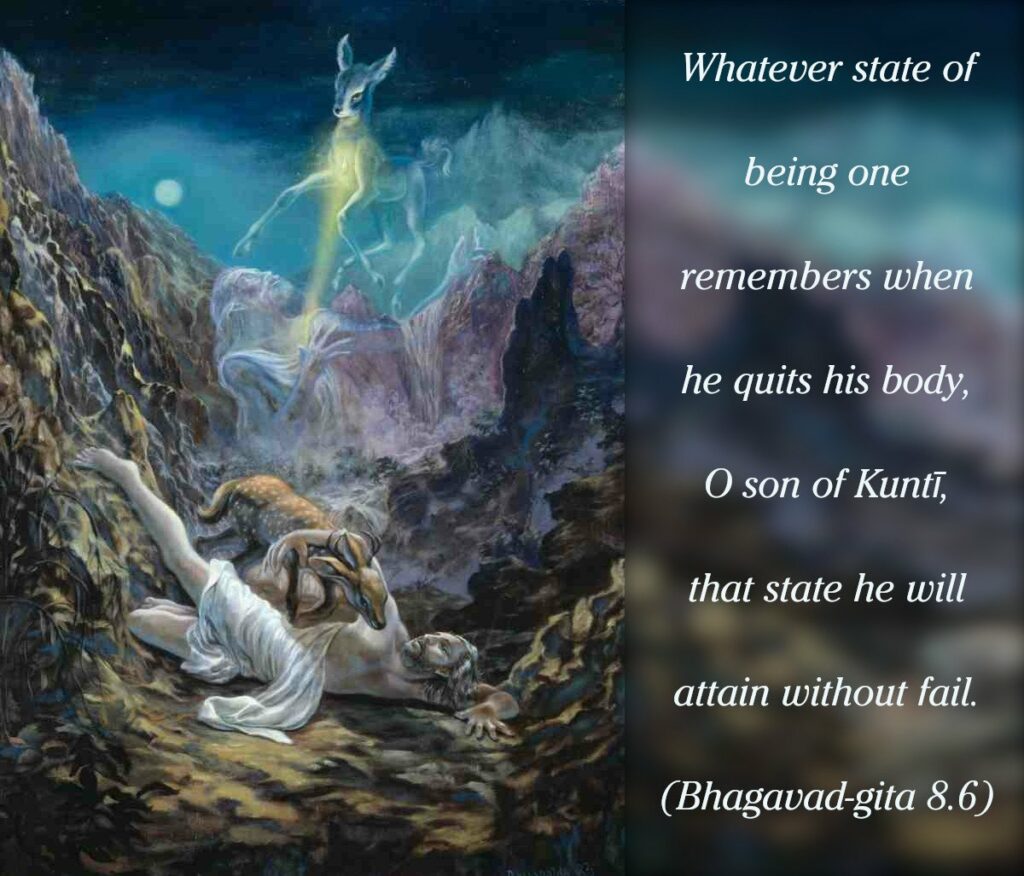यं यं वापि स्मरन्भावं त्यजत्यन्ते कलेवरम् |
तं तमेवैति कौन्तेय सदा तद्भावभावित: || 6||
yaṁ yaṁ vāpi smaran bhāvaṁ tyajatyante kalevaram
taṁ tam evaiti kaunteya sadā tad-bhāva-bhāvitaḥ
yam yam—whatever; vā—or; api—even; smaran—remembering; bhāvam—remembrance; tyajati—gives up; ante—in the end; kalevaram—the body; tam—to that; tam—to that; eva—certainly; eti—gets; kaunteya—Arjun, the son of Kunti; sadā—always; tat—that; bhāva-bhāvitaḥ—absorbed in contemplation
Translation:
For whatever object a man thinks of at the final moment, when he leaves his body— that alone does he attain, Ο son of Kunti, being ever absorbed in the thought thereof.
Commentary:
Whatever a man thinks and contemplates frequently, becomes a tendency which holds the mind enslaved by ill-power and momentum. So it is said that whatever form or object the dying man thinks, he will obtain when he takes a new birth. Jadabharata in spite of his great tapas was attached to a fawn which he protected and when he passed away, the thought of the fawn filled his mind. Consequently, he was born as a deer. As one thinks so he becomes (Yadbhavam tadbhavati). This being the law, every thoughtful man should be extremely careful to choose and select only noble and spiritual thoughts to fill the mind. This should be practised throughout one’s life, so that they should be uppermost in the mind at the time of death. As all other things in the world are pain-causing, sorrow-breeding, the wise man naturally thinks of the Blessed Lord as the be-all and end-all of his life. Thus man attains the supreme state. Devotion, Dhyana, study, company of the wise, charity, all these should be practised truthfully and by so doing, divine thoughts permeate the mind and determine the future birth of man.
That is why spirited sadhana is prescribed from childhood when the mind is pure and free from the poisonous ugliness of worldly life. Every man is himself responsible for his freedom or bondage. “If one thinks that he is free, free he is this moment. If he thinks he is bound, bound he should be.” Either high birth or low birth or freedom from birth and death, all these depend on man’s mental frame. And this frame of mind is forged by long practice throughout life. The good samskaras would re-assert themselves in the next birth and lead him to the goal.
Swami Vivekananda Says —
When a yogi makes a samyama (*) on his own karma, upon those impressions in his mind which are now working, and those which are just waiting to work, he knows exactly by those that are waiting when his body will fall. He knows when he will die, at what hour, even at what minute. The Hindus think very much of that knowledge or consciousness of the nearness of death, because it is taught in the Gita that the thoughts at the moment of departure are great powers in determining the next life.[Source]
Sri Ramakrishna Says —
“Man becomes pure by repeating the name of God. Therefore one should practise the chanting of God’s name. I said to Jadu Mallick‘s mother: ‘In the hour of death you will think only of worldly things—of family, children, executing the will, and so forth. The thought of God will not come to your mind. The way to remember God in the hour of death is to practise, now, the repetition of His name and the chanting of His glories. If one keeps up this practice, then in the hour of death one will repeat the name of God. When the cat pounces upon the bird, the bird only squawks and does not say, ‘Rama, Rama, Hare-Krishna’.
“It is good to prepare for death. One should constantly think of God and chant His name in solitude during the last years of one’s life. If the elephant is put into the stable after its bath it is not soiled again by dirt and dust.” (Source: Gospel of Sri Ramakrishna)
—–
VAISHNAVA: “Sir, is a man born again?”
MASTER: “It is said in the Gita that a man is reborn with those tendencies that are in his mind at the time of his death. King Bharata thought of his deer at the time of death and was reborn as a deer.” (BG 8.5, BG 8.6)
VAISHNAVA: “I could believe in rebirth only if an eye-witness told me about it.”
MASTER: “I don’t know about that, my dear sir. I cannot cure my own illness, and you ask me to tell you what happens after death!
“What you are talking about only shows your petty mind. Try to cultivate love of God. You are born as a human being only to attain divine love. You have come to the orchard to eat mangoes: what need is there of knowing how many thousands of branches and millions of leaves there are in the orchard? To bother about what happens after death! How silly!” (BG 8.7, BG 8.8) (Source: Gospel of Sri Ramakrishna)
All this is Brahman. Everything comes from Brahman, everything goes back to Brahman, and everything is sustained by Brahman. One should therefore quietly meditate on Brahman. Each person has a mind of his own. What a person wills in his present life, he becomes when he leaves this world. One should bear this in mind and meditate accordingly.
— Chandogya Upanishad 3.14.1
Question: What shall be the nature of the future birth for man?
Answer: It is determined by that idea or object which dominates the mind at the time of death.
Question: How can man retain spiritual thought at the last moment?
Answer: By a whole life-time of sadhana.
* A specific mode of concentration; for details, see Patanjali’s Yoga Sutras.
Bhagavad Gita: Chapter 8 🔻 (28 Verses)
Related Articles:
